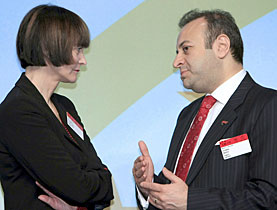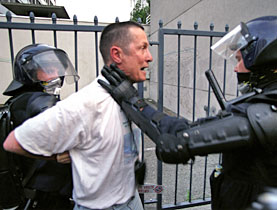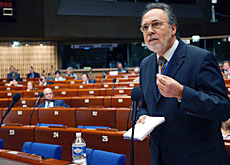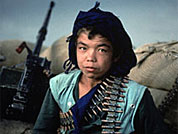Swiss set out ambitions for Council of Europe

Switzerland aims to use its six-month presidency of the Council of Europe, which starts in November, to push for the reform of the European Court of Human Rights.
After listening to Foreign Minister Micheline Calmy-Rey outlining Swiss plans, representatives of the member states meeting in Madrid on Tuesday approved her call for a conference on the issue to be held in Interlaken in the Swiss Alps next February.
Calmy-Rey told her counterparts that Switzerland wanted the member states to reaffirm their commitment to guarantee the rights defined in the European human rights convention and to work to make the court as effective as possible.
She also called on them to support the court’s own efforts to improve its efficiency in the short term, and to launch a process of structural reform in the medium term.
“We received clear political support in Madrid,” Paul Seger, head of the directorate of international law at the Swiss foreign ministry, and a member of the Swiss delegation, told swissinfo.ch.
Victim of its success
“The important thing is to get strong political support to reassert the court’s central role in ensuring and monitoring respect for the rights of individuals in Europe, political support to enable the court to reform itself and to launch a far-reaching reform of the court,” he explained.
He described the court as “a victim of its own success” and stressed the importance of preventing the huge backlog of cases – 100,000 at present – from further building up.
The Madrid meeting took an important step in this direction by accepting the provisional application of a protocol that will allow a judge acting alone to throw out the large number of inadmissible cases, Seger said.
Furthermore, a committee of three judges, rather than seven as at present, will now deal directly with cases similar to those the court has already ruled on.
Until now such a move had been blocked by Russia, which has still not ratified the protocol in question, thus preventing it from coming into force.
“We managed to get round this difficulty by allowing the protocol to be applied provisionally by those countries who so desire,” Seger explained. “And in fact Switzerland was one of the first countries that decided to do so.”
Swiss plans
Encouraged by these results, Switzerland is getting ready for its term as president and for the conference it is to host.
“We are going to work with the court and the other bodies of the Council of Europe to get them to formulate their vision of how the court should be reformed,” said Seger, adding that Switzerland would also try to bring together states which regarded themselves as “friends of the court”, to promote this reform.
The aim of the conference in Interlaken will be to prepare the ground for reforms that will take some time to be carried through.
Swiss human rights experts also point to the exceptional importance of the court.
“It is autonomous and the states concerned are obliged to follow its decisions. The equivalent courts for Africa or the American continent do not have the same power,” Adrien-Claude Zoller, head of the non-governmental organisation Geneva for Human Rights, told swissinfo.ch.
Andrew Clapham, director of the Geneva Academy of International Humanitarian Law and Human Rights, agrees.
“The court produces rulings which have a great impact on the 800 million people living in the member states of the Council of Europe,” he said.
“Other international bodies with responsibility for human rights, like the Human Rights Council in Geneva, or the Human Rights Committee in New York, have to take into account what is done in Strasbourg, where the court sits.”
Changing the focus
But Switzerland does not intend to confine its interests to reforming the Court of Human Rights.
“As Micheline Calmy-Rey stressed in Madrid, Switzerland will continue to campaign for the Council of Europe to refocus its activities,” Seger said.
“To be able to work properly, the Council of Europe should not concern itself with everything, but focus on human rights, democracy and federalism. Three basic areas for the Council.”
For Seger, this is the way to assert its difference with other European organisations, such as the European Union. But he admits that not all the members agree.
Frédéric Burnand in Geneva, swissinfo.ch (Adapted from French by Julia Slater)
The Council of Europe was founded in 1949. Its seat is in Strasbourg.
Its focus is on human rights, democracy and the rule of law.
It currently has 47 member states and five observer states (Vatican City, United States, Canada, Japan and Mexico).
The foreign ministers of its member states make up its Committee of Ministers,
The six-month presidency of the Committee of Ministers rotates among Council members following English alphabetical order.
The Parliamentary Assembly is made up of members of parliament from the member states.
The European Court of Human Rights (which enforces the European Convention on Human Rights) is one of its main bodies.
It is the highest European court for human rights.

In compliance with the JTI standards
More: SWI swissinfo.ch certified by the Journalism Trust Initiative





You can find an overview of ongoing debates with our journalists here. Please join us!
If you want to start a conversation about a topic raised in this article or want to report factual errors, email us at english@swissinfo.ch.